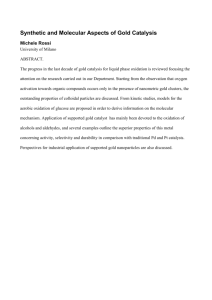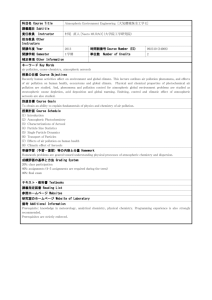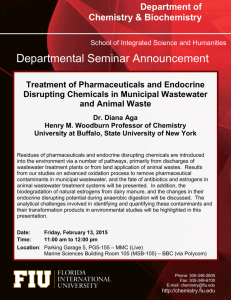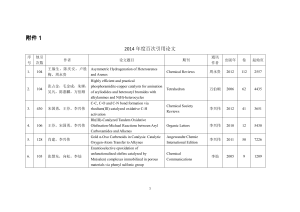Environmental Science and Engineering牋 0830 1.Overview
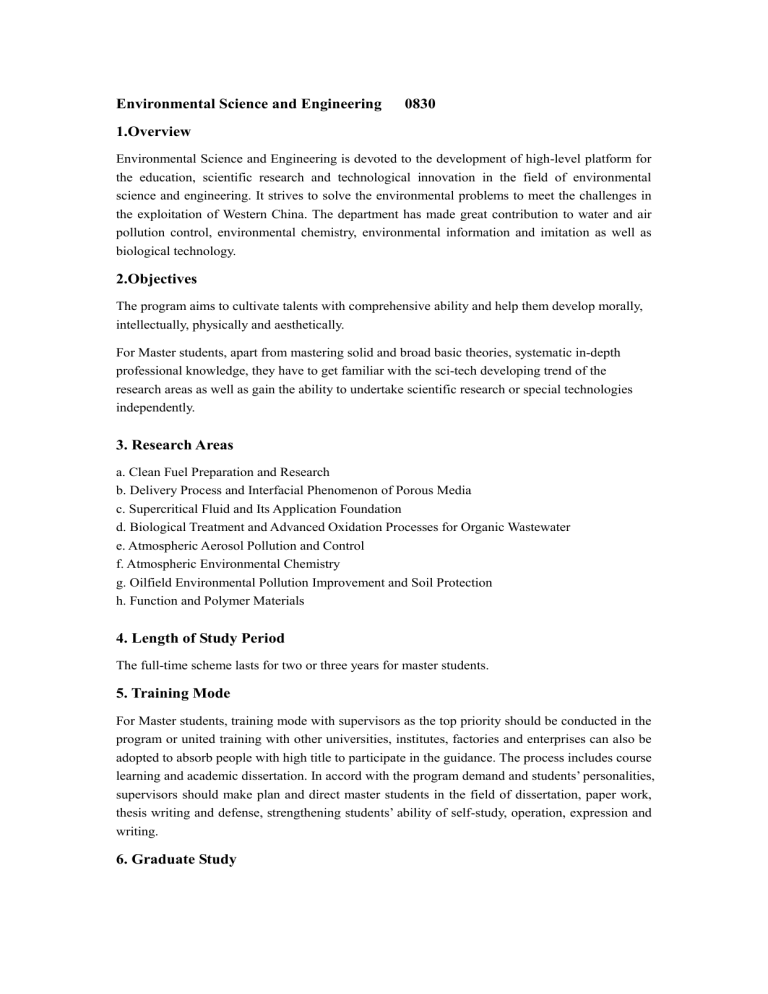
Environmental Science and Engineering 0830
1.Overview
Environmental Science and Engineering is devoted to the development of high-level platform for the education, scientific research and technological innovation in the field of environmental science and engineering. It strives to solve the environmental problems to meet the challenges in the exploitation of Western China. The department has made great contribution to water and air pollution control, environmental chemistry, environmental information and imitation as well as biological technology.
2.Objectives
The program aims to cultivate talents with comprehensive ability and help them develop morally, intellectually, physically and aesthetically.
For Master students, apart from mastering solid and broad basic theories, systematic in-depth professional knowledge, they have to get familiar with the sci-tech developing trend of the research areas as well as gain the ability to undertake scientific research or special technologies independently.
3. Research Areas a. Clean Fuel Preparation and Research b. Delivery Process and Interfacial Phenomenon of Porous Media c. Supercritical Fluid and Its Application Foundation d. Biological Treatment and Advanced Oxidation Processes for Organic Wastewater e. Atmospheric Aerosol Pollution and Control f. Atmospheric Environmental Chemistry g. Oilfield Environmental Pollution Improvement and Soil Protection h. Function and Polymer Materials
4. Length of Study Period
The full-time scheme lasts for two or three years for master students.
5. Training Mode
For Master students, training mode with supervisors as the top priority should be conducted in the program or united training with other universities, institutes, factories and enterprises can also be adopted to absorb people with high title to participate in the guidance. The process includes course learning and academic dissertation. In accord with the program demand and students’ personalities, supervisors should make plan and direct master students in the field of dissertation, paper work, thesis writing and defense, strengthening students’ ability of self-study, operation, expression and writing.
6. Graduate Study
Table5 Curriculum structure of Master
Course Module Course Code
Communicaiton
Degree Courses
Optional
Compulsory
272004
LITE6102
272003
LITE6101
072010
EVNG6106
072011
EVNG6107
032127
EVNG7102
072003
BICH6104
001997
BXHJ6003
001994
Course Title
Comprehensive Chinese
The Outline of China
Biological Treatment of
Wastewater
Advanced Environmental
Chemistry
Environmental Catalysis
Environmental Biochemistry
Students can select any course at the list of Graduate School
Mid-term Assessment
Mid-term Assessment
Credits
2
2
2
2
2
2
1
3
Thesis BXHJ6008 25
Total
Minimum
Requirement
12
7. Academic Dissertation
Master thesis should be finished independently by students under the guide of supervisors. The thesis, which should be prepared at least 1 year, must be systematic and complete with new insights. The topics should be identified with the help of supervisors and through reading documents and doing investigation.
The thesis should be concise, rigorous and accurate in theoretical guidance and computation. The presentation should be conducted with a pragmatic scientific attitude.
At least two paper reviewers with senior titles who get familiar with the paper are needed. The other should come from other departments. For instance, if the paper focuses on software design or development, one of the reviewers should be familiar with it and do the acceptance. The defence can only be conducted with the agreement of the reviewers. If one reviewer disagrees, another one should be employed; if two reviewers reject, the defence can only be conducted after reapplying through revising the paper.
Thesis need review and defence. When presenting an oral defense, graduates are supposed to answer questions related to the thesis, including professional basic theory and specialized knowledge.
8. Research Centers
1)Research Center of Biotreatment of wastewater and bioremediation of polluted soil
4
6
4
25
51
Bio-technology with its low costing, energy saving, and bio-energy producing becomes an important developing direction of the treatment of contaminant in wastewater and polluted solid. This technology is developing very fast in recent decades. Our research mainly focuses on the application of microbiology for contaminants degradation and transformation, then to treat the wastewater and remediate the polluted soil environment. Especially we apply aerobic and anaerobic bacteria to biodegradation, biotransformation and bioremediation of complicated or hazardous organic and inorganic contaminants including lignin and its derivatives,
PAHs (polycyclic aromatic hydrocarbon), MTBE (methyl tert-butyl ether), as well as some heavy metals like arsenic and lead.
2)Atmospheric Environment Research Center
The research fields of this center include: urban air pollution (such as PM and traces gases) distribution and controlling methods; advanced technologies to control vehicle emissions (such as VOCs and NOx) and industry emissions (industry VOCs), atmospheric environment planning and management.
3)Advanced oxidation technologies (AOTs) Research Center
This center focuses on using the hydroxyl free radicals to oxidize the pollutants. The present research mainly focus on chemical oxidation by powerful oxidants such as ozone, chlorine dioxide and hydrogen peroxide, electrocatalytic oxidation and fuel cell technology, photocatalytic oxidation process, ultrasonic process, super critical water oxidation process, microwave process and the combination of various AOTs.
9. Description of Courses
(1)072003 Environmental Biochemistry
Credits : 2
Prerequisites:
Environmental Chemistry
Environmental Microbiology
Environmental Engineering
Advanced environmental biochemistry is a course introducing biochemical principles and theories and their use in environmental science and engineering. This course lays particular stress on the following two aspects: the principles and application of modern biochemical technology (enzyme engineering, gene engineering, cell engineering, fermentation engineering) in environmental science and engineering, biochemistry principles in environmental pollution control and purification, pollution prevention, biological monitoring.
(2)072010 Wastewater biological treatment
Credits : 2
Prerequisites:
Environmental Chemistry
Wastewater treatment
Environmental Engineering
Biotechnology can be used to convert organic pollutants in wastewaters to biomass energy and recover the other resources. At the same time, the pollution is eliminated. So wastewater biological treatment (WWBT) is fast developing in the technical field for water pollution control.
This course thoroughly introduces the advanced WWBT and the biogas and biomass utilization.
The content of the course includes wastewater characteristics, the biological and chemical principles, aerobic and anaerobic bio reaction process and bioreactors, elementary calculations, the production and utilization of biogas, cleaner production for industrial process, as well as case studies of some treatment technology for typical industrial wastewaters.
(3)032127 Environmental Catalysis
Credits : 2
Prerequisites:
Atmospheric Pollution Controlling Technology
Environmental Chemistry
Environmental Engineering
Environmental Catalysis is an interdiscipline of environmental science and catalysis science. The study of environmental catalysis is central to finding more effective solutions to chemical pollution by catalysis. In the past 30 years, substantial achievements, as represented by three-way catalyst for exhaust of automobile, were gained in environmental catalysis. It has been attracted much attention from the catalysis and environmental science, due to a relatively independent system. Based on the relationship between environment and catalysis, the distinguish feature, studying method, theory, achievement and progress of environmental catalysis is reviewed and discussed in this course.
(4)072011 Advanced Environmental Chemistry
Credits : 2
Prerequisites:
Inorganic chemistry
Organic chemistry
Environmental chemistry
Environmental chemistry is a kind of science on discussing and solving the chemical related environment problems by using the basic theoretical knowledge on chemistry, which is closely related to the practical production and daily life. Based on the main line of expounding the migration and transformation process and effects of the typical environment pollutants in different environmental media, this course is to thoroughly explain the process of these mechanisms, laws and disposal methods. Meanwhile, the latest research results and progress on the environmental chemistry and environment engineering field are also contained by this course. Through the telling and seminars for the contents of the four projects, this course enables students firstly to master the basic knowledge of original environmental chemistry, secondly to deeply understand and master environmental effects of the poisonous and harmful materials in our environment, the typically chemical principles on the removal techniques of the environmental pollutant, and the new technology on pollution control. After mastering all of the knowledge mentioned above, students can engage themselves in some research related to environmental science and engineering for the future.

